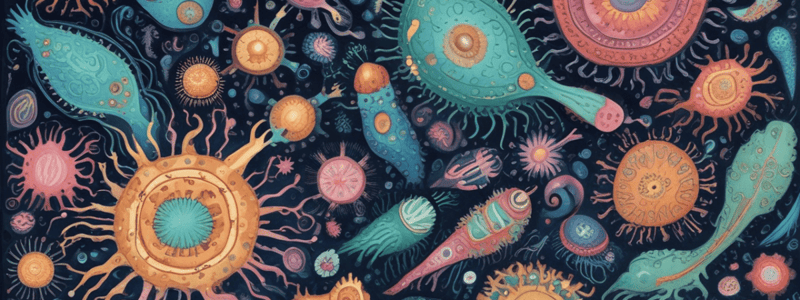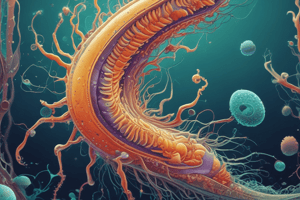Podcast
Questions and Answers
Which of the following is NOT a type of motility exhibited by protozoa?
Which of the following is NOT a type of motility exhibited by protozoa?
- Capsular movement (correct)
- Amoeboid movement
- Ciliary movement
- Flagellar movement
What is the primary mode of transmission of Wuchereria bancrofti?
What is the primary mode of transmission of Wuchereria bancrofti?
- Mosquito vectors (correct)
- Infected soil
- Direct contact with an infected person
- Contaminated food and water
Which of the following is NOT a type of helminth?
Which of the following is NOT a type of helminth?
- Cestode
- Arthropod (correct)
- Nematode
- Trematode
What is the primary method of prevention against parasitic diseases?
What is the primary method of prevention against parasitic diseases?
Which protozoan is responsible for causing dysentery?
Which protozoan is responsible for causing dysentery?
What is the name of the disease caused by Taenia saginata?
What is the name of the disease caused by Taenia saginata?
Which of the following is NOT a type of asexual reproduction in protozoa?
Which of the following is NOT a type of asexual reproduction in protozoa?
What is the name of the medication commonly used to treat protozoan infections?
What is the name of the medication commonly used to treat protozoan infections?
Flashcards
Protozoa reproduction
Protozoa reproduction
Protozoa reproduce through both sexual and asexual methods, including binary fission, schizogony, gametogony, and conjugation.
Protozoa motility type
Protozoa motility type
Protozoa move using flagella, cilia, or amoeboid movement.
Entamoeba histolytica
Entamoeba histolytica
A protozoan causing dysentery.
Helminth classification
Helminth classification
Signup and view all the flashcards
Schistosoma species
Schistosoma species
Signup and view all the flashcards
Enterobius vermicularis
Enterobius vermicularis
Signup and view all the flashcards
Giardia lamblia
Giardia lamblia
Signup and view all the flashcards
Treatment for parasite infections
Treatment for parasite infections
Signup and view all the flashcards
Study Notes
Protozoa
- Unicellular eukaryotic organisms with complex life cycles, contributing to diverse ecological roles.
- Reproduce through sexual and asexual methods; motility is achieved via flagella, cilia, or amoeboid movement.
- Asexual reproduction methods include:
- Binary fission: a single organism divides into two equal parts.
- Schizogony: multiple divisions occur before cell division, producing many offspring simultaneously.
- Sexual reproduction involves:
- Gametogony: formation of gametes.
- Conjugation: exchange of genetic material between organisms.
- Significant intestinal protozoa impacting human health:
- Entamoeba histolytica: causes dysentery.
- Balantidium coli: linked to gastrointestinal distress.
- Giardia lamblia: causes giardiasis, leading to diarrhea.
- Trichomonas vaginalis: sexually transmitted infection causing vaginitis.
- Cryptosporidium parvum: causes cryptosporidiosis, resulting in watery diarrhea.
- Isospora belli: associated with opportunistic infections, especially in immunocompromised individuals.
- Diseases from protozoan infections can range from mild gastrointestinal disturbances to severe conditions like liver abscesses.
Helminthes (Worms)
- Classified into three main groups:
- Nematodes (roundworms)
- Trematodes (flukes)
- Cestodes (tapeworms)
- Trematodes include:
- Liver flukes, intestinal flukes, blood flukes, and lung flukes.
- Schistosoma species cause schistosomiasis, a significant health issue in endemic areas.
- Cestodes examples:
- Taenia saginata (beef tapeworm) leads to taeniasis.
- Hymenolepis nana (dwarf tapeworm) causes hymenolepiasis, particularly in children.
- Nematodes examples:
- Enterobius vermicularis (pinworm) leading to enterobiasis, common in children.
- Ascaris lumbricoides (roundworm) causes ascariasis, affecting nutrient absorption.
- Wuchereria bancrofti: causative agent of elephantiasis, transmitted through mosquito bites, causing severe lymphedema.
General Treatment
- Treatment strategies vary based on the specific parasite involved:
- Common medications include:
- Metronidazole and Tinidazole for protozoal infections.
- Specific antimalarial drugs integrated based on the malaria parasite type.
- Common medications include:
- Prevention strategies emphasize:
- Adopting proper hygiene and sanitation practices.
- Avoiding ingestion of contaminated food and water to decrease infection risk.
Studying That Suits You
Use AI to generate personalized quizzes and flashcards to suit your learning preferences.




